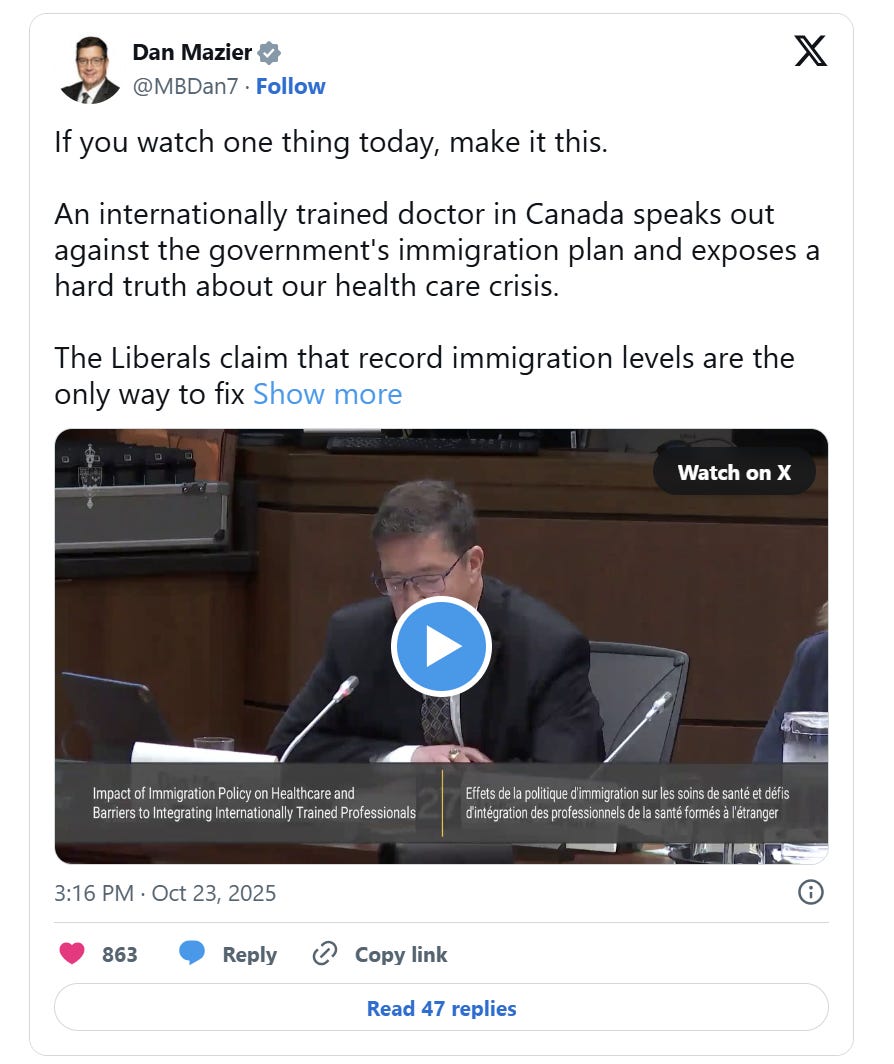Foreign-trained doctors ask: why import more when we’re ready?
Internationally trained physicians living in Canada are questioning why Canada needs to import more doctors when there are “thousands in each province” willing to work.
Internationally trained physicians living in Canada are questioning why Canada needs to import more doctors when there are “thousands in each province” willing to work but are unable due to their education being unrecognized.
During a House of Commons health committee meeting on Thursday, Dr. Therese Bichay, the director of Internationally Trained Physicians in Canada and a physician from Egypt, called on the federal government to license internationally trained physicians (ITPs) already in Canada before bringing in new migrants who will face similar issues if the system is not fixed.
During Bichay’s opening remarks, she noted significant barriers ITPs face who hope to practice in Canada, such as requirements for “recency of practice” in a country that doesn’t allow them to work. She also noted that 6.5 million Canadians don’t have access to a family doctor, and wait times in the country continue to grow, while many ITPs are “ready to serve.”
Following a question from Conservative health critic Dan Mazier, Bichay told the committee she believes internationally trained physicians who have passed all their exams, such as herself, should be given a licence. Thousands of such doctors, she said, are already working in the healthcare system in roles they are overqualified for as Canada faces healthcare shortages.
“(They’ve) already passed all the required exams, got their credentials verified, and they are ready to serve, and they are already contributing to the healthcare system here by either working as a clinical assistant, volunteering, doing many things,” Bichay said. “So why are you bringing more from outside the country when we are still here and we are already Canadian citizens here?”
Bichay said she is one of the 80,000 health professionals in Canada who, according to the Ministry of Health, are not currently working in their own fields.
Earlier during the committee meeting, Dr. Christopher Watling, the CEO of the Royal College of Physicians and Surgeons, said an estimated 13,000 ITPs are in Canada and are unable to work.
Bichay said she’s spent around $60,000 to $70,000 on the process of getting licensed in Canada, with the hope of becoming a doctor, but she wonders whether becoming a licensed practitioner in Canada is even possible anymore.
She said Canada’s system requires ITPs to have “recency of practice” every couple of years, and because she isn’t licensed in Canada, she has to go back to Egypt, risking losing her current job to do so, to work for up to six months to ensure she still has those credentials.
She noted that travel costs, the costs of exams and other certifications such as Critical Analysis and Reasoning Skills, Practice Ready Assessments, and taking time off work to study have piled up over the years.
When asked if she thought she was promised a position as a doctor before she committed to moving to Canada, Bichay said there was a disconnect, as immigrants get extra points for being practicing physicians and having a medical education.
“You feel that you’re going to be appreciated. You’re going to have an opportunity to practice medicine over there when your credentials are verified. You feel that this country is welcoming you and they need you,” Bichay said. “But when you land here, you find many and many barriers coming after one another. So when you fulfill one requirement, you get other barriers you try to fulfill.”
Bichay noted that there is a “big gap” between Canada’s healthcare system and its immigration system.
“When you are immigrating, you feel that you are welcomed. And the process is easy. Once you come here, it’s a clear process. You get your exams done, you will be able to practice,” she said. “But there is no connection, because when you arrive here, you find it a totally different process.”
Bichay called for immigrants to have “a better picture” of the process when planning to move to Canada and said prospective immigrants should be able to begin the certification and licensing process before arriving. Conservative Leader Pierre Poilievre made a similar proposal during the last election.
She called for a “transparent and fair” national process that leads to licensing for ITPs and that Canada needs to increase spots for ITPs to access credentials.
As rural communities such as Northern Ontario remain chronically understaffed, which often leads to closures of clinics or hospitals, Bichay said ITPs, including herself, would be willing to move to remote locations if they were allowed to practice in Canada.
She also noted that several members of her organization have moved to the U.S., U.K., and even Australia because those countries allow them to work, whereas it takes them years to do the same in Canada.
Liberal MP Doug Eyolfson agreed with Conservatives that delays in practice for ITPs caused by overwhelming bureaucracy were an issue, but noted that provinces would have to get on board with the plan, as healthcare is a provincial jurisdiction.
Another witness at the committee, Dr. Rani Srivastava, the president-elect of the Canadian Association of Schools of Nursing, advocated for a “personalized approach” to licensing internationally trained healthcare professionals, as some may only need months of top-up training, while it may take others years.





Because common sense solutions are not welcome in this country any longer…….
More bureaucratic bullshit, while canadians don't have health care! Really WTF?